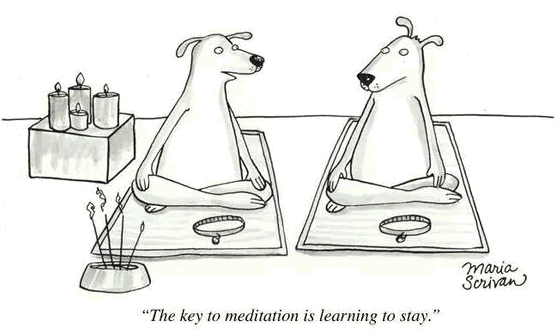- Meditation is hard.
- I can’t meditate.
- I’m no good at meditation.
- I find meditation frustrating.
- Meditation is boring.
These are just a few of the comments I commonly hear from people who have tried to meditate; even from people who have been meditating for years. Conversely, but much more rarely, I come across people who insist that meditation is easy. “I find it deeply relaxing and enjoyable,” they say.
What are these latter folk doing, that the former aren’t?
Firstly, let’s look at some common meditation experiences. Most people — when they decide to meditate — find that:
- thoughts just never — or very rarely — stop
- their minds stay busy, and won’t stay put, no matter how many times they remind themselves to stay focused
- they suddenly feel dead tired, and their head keeps dropping forward
- agitation or irritation descends upon them seemingly out of nowhere
- they find themselves creating to-do lists and thinking about what they’re going to wear, or cook tomorrow
- they fantasise about being somewhere (or someone) else entirely
- they just can’t get comfortable, or remain still
- they keep forgetting that they were ‘meant’ to be meditating
- they sometimes feel dizzy, or nauseous
- focusing on the breath (or body) makes them feel tense, or anxious, or uncomfortable, or unnatural
- they get distracted by traffic noise, or a clock ticking, a conversation, or other sounds
- they get caught up in memories, or plans or thoughts about work
- they feel angry, or sad, or judge their emotions as somehow inappropriate
Those who struggle with meditation tend to think that all these common experiences are sure signs of failure. They also often have the notion that their job in meditation is to concentrate so well that their mind goes completely blank. The opposite is true. All these experiences are clear indications of success. They are signs that you’ve relaxed just deeply enough to hear what your body and mind has to say.
The skills of meditation aren’t about trying harder, or achieving some kind of perfection. You don’t have to do better, or get there faster. Those who find meditation easy and enjoyable are happy being mediocre meditators. Their concern is not with sitting perfectly still, or emptying their mind, or even feeling calm. Instead, they see meditation as an opportunity to listen, and to be kind and gentle with themselves. A prickly, pressured attitude is not required. You don’t want to be the drill sergeant in meditation. You want to be the kindly grandmother; the one whose voice is soothing, and whose touch is tender. Just imagine how much more relaxed you’d feel sitting on the verandah with your grandma, as opposed to marching around the parade ground with a drill sergeant!
Meditation is an intimate relationship with yourself, and great tenderness is the key to success. The skills of meditation are essentially the same as those in any healthy relationship: giving attention, understanding and love. You create a space for honest communication. It is not about domination and control. — Lorin Roche & Camille Maurine
Here’s something to try next time you meditate. Forget about controlling your thoughts. Forget about sitting still. Forget about trying to feel calm. Instead, nurture a sense of self compassion. If your head feels frantic or overloaded, consider how you might soothe those inner voices. If your body feels tired or sore and your muscles ache, consider how you might gently massage those sensations with the very attention you give them. And if you feel down, or cranky, or upset, consider how you might learn to tolerate these emotions, to give them space and not to scold yourself for having such feelings.
If you’re a very driven, goal-directed type of person these suggestions might seem counter-productive, flaky or silly. Your challenge — your discipline — might be to soften and let go. To relinquish the ideals of effort, striving, hard work and control might seem live giving up, or like admitting defeat. Give up anyway. You may be surprised at how good you feel when you put your effort into letting go of effort. You may also find it surprisingly difficult. If that’s the case, simply remember a time when you received some unsolicited kindness; a gift, a word of praise, a pat on the back, some loving gesture. Notice how this feels inside, and endeavour to adopt this same quality of attention with regard to your own thoughts and feelings. Treating yourself with kindness is like eating well. It’s healthy, nutritious and energising.

